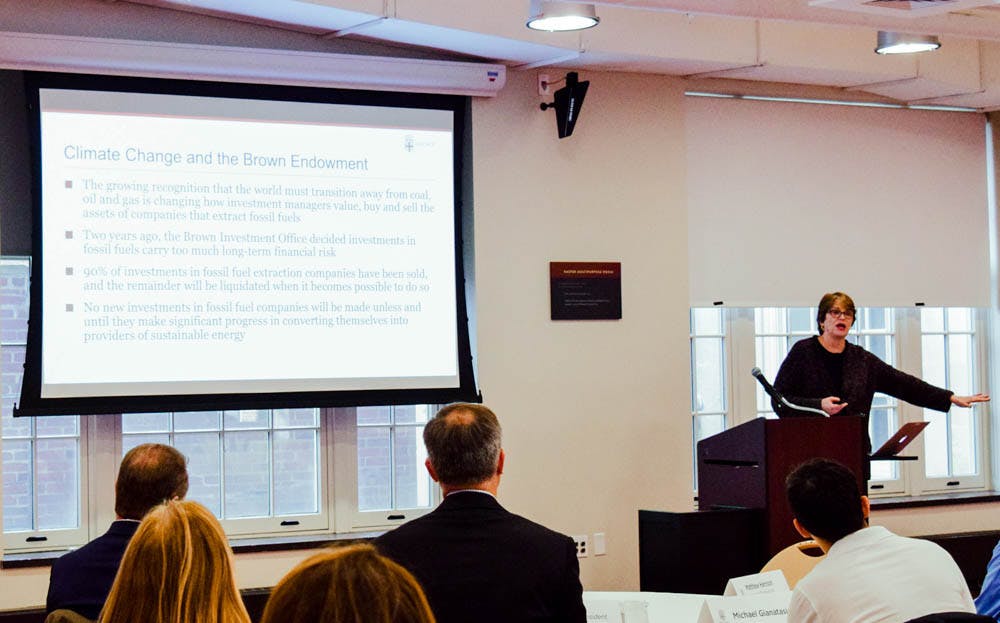President Christina Paxson P’19 addressed community concerns regarding COVID-19 coronavirus at the Brown University Community Council meeting March 10. Paxson also discussed campus sustainability updates, a report on the upcoming construction of new residence halls and the status of the BrownTogether fundraising campaign.
Paxson opened the meeting by reiterating recent campus announcements concerning coronavirus. There are currently no confirmed or presumptive cases of COVID-19 on the University campus, though three students have been tested for the virus after potential exposure at an event out of state, she said at the meeting.
“When I think about the priorities of Brown, the first is the health of our community,” Paxson said. “It’s older people … and people with health issues who are really at risk, so I think for students especially, they have to understand that we’re thinking about the whole community.”
Paxson reiterated the decision to suspend all University-sponsored travel both domestically and internationally, the rule to keep gatherings under 100 people and the decision that any students returning from travel to China, Iran, Italy and South Korea have to self-isolate for 14 days before returning to campus, which have been annouced in various emails since last week.
“The second priority is academic continuity,” Paxson said, explaining that the University wants to make sure that students have access to their courses and are able to graduate on time. For example, the University is working on how to help faculty adapt their curricula to work virtually.
“We don’t want to overreact, but we want to be really clear about what the possible downsides are,” Paxson said. She added that if there were an outbreak of COVID-19 at the University, there are not the necessary resources or facilities to quarantine large groups of students. “If it starts, the possibility around spread is pretty high,” she said.
Later in the meeting, Paxson discussed updates to the campus sustainability goals, which were initially released in a letter last week, The Herald previously reported.
Paxson said that although COVID-19 is a major concern on campus now, long term goals are still important: “Coronavirus will go away. (Climate change) is going to be with us, so we don’t want to take our eyes off of that.”
Discussing announced plans to achieve net-zero greenhouse gas emissions by 2040 and reduce them by 75 percent by 2025, Paxson said that the University is building two wind turbines in Texas, creating a solar farm in state and planning to convert the central heating loop to run on recycled biofuel.
During the meeting, Paxson also talked about the University’s decision to sell all of its direct investments and managed funds that focus on fossil fuels.
“It was a financially motivated decision. To go along with that, Brown has been amping up, ramping up its use of (environmental, social and governance) standards when it makes investment decisions,” she said.
Paxson also mentioned the University’s goal to house 80 percent of students on campus and the plans to build a new residence hall between Charlesfield and Power streets.
“One of the benefits for students on campus is to build a strong community,” Paxson said. “But there are some other benefits that are really important. … We’ll be moving students out of the East Side housing market onto campus.”
Paxson updated the community on the BrownTogether campaign, which has a goal of raising $3 billion. As of last week, the campaign had raised more than $2.3 billion, which is tracking ahead of schedule.
In addition to Paxson, Assistant Vice President of Government and Community Relations Al Dahlberg and Chief Digital Officer and Chief Information Officer Bill Thirsk spoke at the Tuesday meeting.
Talking about the 2020 election cycle, Dahlberg gave a report on the University’s political activity policy and the 2020 U.S. Census.
It is important that students and faculty follow the University’s political activity policy “in order to preserve our tax-exempt status,” Dahlberg said.
“As a tax-exempt institution, we need to make sure that our university resources aren’t being used for partisan or political purposes,” Dahlberg said, citing University policy.
In terms of the U.S. Census, Dahlberg explained how University students living off campus will have to coordinate with their roommates in order to submit one census form per household. Students who live on campus will be counted by the University as living in their dorms.
“We’re perilously close to losing one of those (Congressional) seats” in Rhode Island, Dahlberg said, encouraging students living off campus to make sure they are counted in the census.
Thirsk made the final presentation at the meeting, talking about improvements to University technology. He referred to the video conference with Jessica Meir ’99 as an example of technological achievement.
The University is currently creating a portal, which will be known as myBrown, to combine all its current access points in one place.
“You will have links based on your role — faculty, staff, students — it takes you exactly to those resources you need,” Thirsk said. “We’re doing a lot of engagement and integration across different systems to help faculty get to where they need to go quickly.”
The University has other technological goals to work towards, including expanding the use of digital engagement tools in classrooms, improving the speed of the online pre-registration process and continuing to expand resources for researchers.
“The goals really create a culture of innovation,” Thirsk said. “People learn how to take chances and risks and expand the base of capable leaders.”





